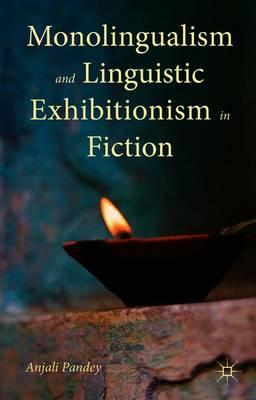Full Product Details
Author: Anjali Pandey
Publisher: Palgrave Macmillan
Imprint: Palgrave Macmillan
Edition: 1st ed. 2016
Dimensions:
Width: 14.00cm
, Height: 2.20cm
, Length: 21.60cm
Weight: 4.974kg
ISBN: 9781137340351
ISBN 10: 1137340355
Pages: 302
Publication Date: 09 November 2015
Audience:
Professional and scholarly
,
Professional & Vocational
Format: Hardback
Publisher's Status: Active
Availability: In Print

This item will be ordered in for you from one of our suppliers. Upon receipt, we will promptly dispatch it out to you. For in store availability, please contact us.
Reviews
'This wide-ranging linguistic and literary exploration of cosmetic multilingualism is a pioneering work, addressing the most neglected and yet the fascinating aspect of language mixing.' - Tej K. Bhatia, Syracuse University, USA 'Pandey is bold in registering the new, 21st-century forms of linguicide. She zeroes in on millennial, prize-winning authors like Adiga, Lahiri, Ali, and Rushdie who, by deploying and marketing token multilingualism and other covert forms of forfeiture in their works, further help hierarchize languages at the expense of 'minor' languages. They delude us with comfortable notions of 'hybridity' while they 're-English' our post-global, 'flat'-worldist era. Pandey's book sends shivers down the spine of postcolonial theorists by sounding the death-knell of planetary linguistic diversity.' - Chantal Zabus, University Paris 13 - Sorbonne Paris Cite, France 'This book by Anjali Pandey confronts us with multilingualism in prize-winning fiction and the questions that this raises. Why are the authors choosing to do so? Is it cosmetic multilingualism or is there more going on? And whatever it is, what are its effects on readers? What does it disrupt? Would literature enable us to cross the divide between monolingualism and multilingualism that human beings have not been capable of? These are some of the important questions that this fascinating book attempts to answer. Pandey destabilizes our traditional notions of literature tied to one language and one nation, as she focuses on the multilingual strategies of the transnational authors that she studies.' - Ofelia Garcia, The Graduate Center, City University of New York, USA 'There is a pressing need for more language-based work in postcolonial literary studies. This lively book helps meet that need with its in-depth study of multilingualism in the context of contemporary brand-conscious postcolonial fiction, which the author provocatively likens to 'literary outsourcing' in the wake of the global turn.' - Graham Huggan, University of Leeds, UK
Author Information
Anjali Pandey is Professor of Applied Linguistics at Salisbury University, USA. She is a previous winner of the Vogel Award of Teaching Excellence in North Dakota, recipient of the Welcome Fellowship from the Maryland Higher Education Commission, and three-time winner of discretionary language projects for multilingual newcomers from the United States Department of Education.




